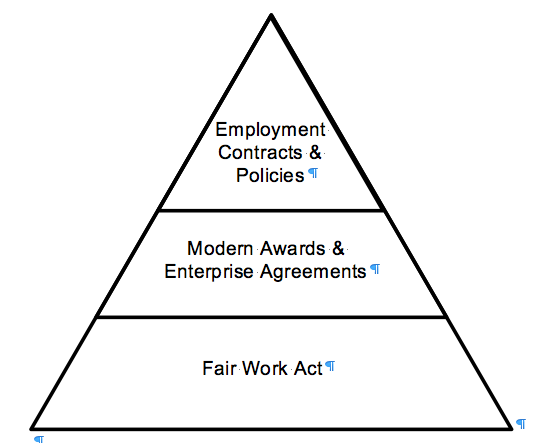Sources of Employment Rights and Obligations
Based on the contribution of Craig Dowling and Neill Campbell for The Law Handbook 2016, published by Fitzroy Legal Service, originally amended by ClareMcKenzie for the NT Law Handbook, as amended by Bradley Allen Love Lawyers, Canberra, by Gabrielle Sullivan, May Oboodi and Robert Allen and current to March 2018. Broadly speaking, the sources of employment rights and obligations are:- The Fair Work Act;
- Modern awards and enterprise agreements;
- Employment contracts and policies;
- Other Commonwealth and state or territory based legislation.
 Each level of the pyramid adds to an employee’s rights. For example, an enterprise agreement cannot be inconsistent with an employee’s rights under the Fair Work Act, and similarly an employment contract cannot be inconsistent with the employee’s rights under the enterprise agreement. It is therefore important to consider all levels of the pyramid when determining an employee’s rights.
Each level of the pyramid adds to an employee’s rights. For example, an enterprise agreement cannot be inconsistent with an employee’s rights under the Fair Work Act, and similarly an employment contract cannot be inconsistent with the employee’s rights under the enterprise agreement. It is therefore important to consider all levels of the pyramid when determining an employee’s rights.
Fair Work Act
The Fair Work Act was passed by the Commonwealth Parliament in 2009 and is the primary piece of legislation governing employment relations in Australia. In short, the Fair Work Act establishes certain minimum conditions of employment for all employees (with a few exceptions) and sets up the framework for industrial relations in Australia. Specifically, the Fair Work Act includes:- the National Employment Standards (discussed further here), which provide certain employees with rights such as annual leave, personal or sick leave and parental leave;
- provisions enshrining employees’ ability to make claims such as unfair dismissal and general protections; and
- provisions concerning the making of modern awards and enterprise agreements.
Modern Awards and Enterprise Agreements
Modern awards (also simply referred to as Awards) are statutory minimum standards of employment that apply specifically to certain industries or occupations. For example, the Clerks—Private Sector Award 2010 [MA0000002] applies to workers who are employed in clerical or administrative roles. A list of modern awards can be found at www.fwc.gov.au. Enterprise agreements are understandings negotiated between employers and their employees (often represented by their union). Proposed enterprise agreements must be submitted to the Fair Work Commission for consideration and approval. If an employer and their employees choose to enter into an enterprise agreement, it will displace any applicable Modern awards that would otherwise set the minimum conditions of employment. Enterprise agreements are also available at www.fwc.gov.au. Modern awards and enterprise agreements are discussed in further detail below.Employment Contracts
Every employment relationship is also governed by a contract of employment (which can be in writing, oral, or partly in writing and partly oral). Employment contracts are important because they determine the type of employment applicable to each worker (as discussed in Types of Workers). This, in turn, determines what rights and obligations apply to the employee and employer. Typically, employers have policies that relate to matters such as privacy, employee conduct, IT and computer usage, and social media (among others). Often, these policies are found to have become incorporated into the employment contract (discussed further in Employment Contracts and Policies). While the Fair Work Act and any applicable Awards or enterprise agreements represent the minimum conditions of employment in Australia, individual employees and employers can negotiate employment contracts that provide additional benefits including higher wages, greater leave entitlements or other conditions of employment. Terms of employment contracts are discussed further in Employment Contracts and Policies. However, an employment contract cannot provide for a lesser entitlement than those contained in the Fair Work Act and/or an applicable Award or Enterprise Agreement. Specifically, the employer must provide the employee with at least every minimum term or condition found in the legislation and the relevant Award or Enterprise Agreement. It is no excuse if the employee agreed to undercut a particular minimum entitlement in return for an employment contract that left them better off overall.Other Sources of Employment Rights and Obligations
In addition to the Fair Work Act, the Federal Government, along with its state and territory counterparts, has enacted specific legislation that touches on employment rights and obligations. Typically, these pieces of legislation will address specific issues. This includes:- Anti-discrimination legislation
- Work health and safety legislation
- Workers compensation legislation
- Superannuation guarantees
- Workplace privacy legislation
 Copyright © by the contributing authors. All material on this collaboration platform is the property of the contributing authors.
Copyright © by the contributing authors. All material on this collaboration platform is the property of the contributing authors. Ideas, requests, problems regarding AustLII Communities? Send feedback
This website is using cookies. More info.
That's Fine
